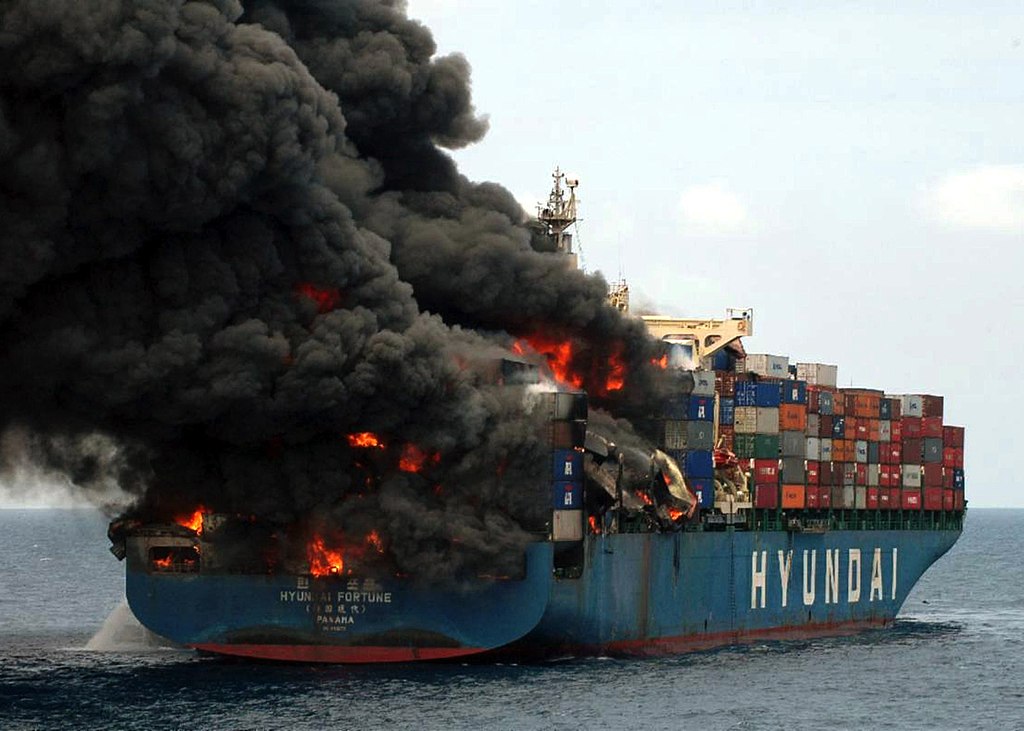Subsection 1.1.5 Fire
Fire aboard ship is an ever-present threat that can swiftly escalate into a catastrophic disaster. With limited means of escape, a ship becomes a confined space where flames can spread rapidly, fueled by combustible materials and confined by its structure.
The close quarters, complex layout, and intricate ventilation systems aboard ship create formidable challenges for the ship’s small firefighting team. In addition to the immediate threat to human lives, a shipboard fire poses a significant risk to the environment, as toxic smoke, potential oil spills, and the release of hazardous substances can wreak havoc on marine ecosystems.

Effective fire prevention measures, comprehensive emergency response plans, rigorous training, and state-of-the-art firefighting equipment are crucial in mitigating this threat and ensuring the safety of everyone on board.
Fire prevention measures play a vital role in minimizing the risk of fire and maintaining a safe environment aboard ship. These measures encompass a range of proactive strategies aimed at preventing fires from starting or spreading. One fundamental aspect is implementing rigorous safety protocols and adhering to international standards, such as the International Maritime Organization’s (IMO) regulations for fire safety.
Some key fire prevention measures include:
- Regular Inspections and Maintenance. Conducting routine inspections of electrical systems, machinery, and fire suppression equipment is crucial. Identifying and addressing potential hazards, faulty wiring, or malfunctioning equipment can prevent fire incidents.
- Training and Education. Crew members should receive comprehensive training on fire safety, including proper handling of flammable substances, effective use of firefighting equipment, and emergency response procedures. Increasing awareness and knowledge among the crew can significantly reduce the likelihood of fire-related accidents.
- Fire Detection Systems. Installing advanced fire detection systems, such as smoke detectors, heat sensors, and flame detectors, helps in early detection of fires. These systems can trigger alarms, alerting the crew and initiating immediate response actions.
- Fire Suppression Systems. Equipping ships with reliable fire suppression systems, such as fixed CO2 or water mist systems, can effectively control and extinguish fires. These systems are designed to release the appropriate extinguishing agent in the affected area, limiting the fire’s spread.
- Proper Storage and Handling. Storing flammable materials in designated areas and following strict protocols for their handling reduces the risk of accidental ignition. Implementing proper waste management procedures and ensuring the availability of suitable fire-resistant containers also contribute to fire prevention efforts.
- Structural Fire Protection. Regulations require fire-resistant materials and insulation in the ship’s construction helps to contain fires and slow down their progression. Fire-resistant doors, bulkheads, and insulation compartmentalize the vessel, preventing the rapid spread of flames.
- Emergency Preparedness. Developing and regularly reviewing comprehensive emergency response plans specific to fire incidents is crucial. This includes establishing evacuation procedures, assigning roles and responsibilities to crew members, and conducting fire drills to ensure everyone knows how to respond swiftly and effectively in an emergency.
By implementing robust fire prevention measures, ships can significantly reduce the risk of fire, enhance the crew’s safety, and protect the marine environment from potential devastation.

